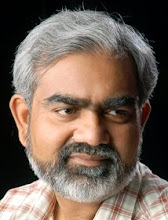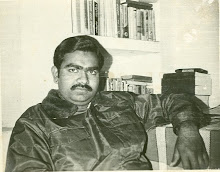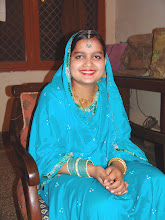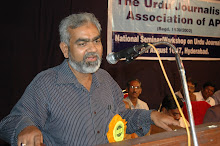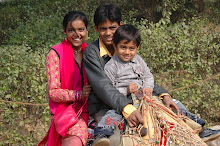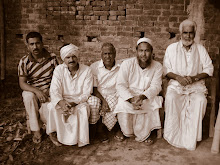CURSE OF IGNORANCE
By Anjum Naim
The first country to be chosen by the then U.S. President Eisenhower to receive the formula of the Salk Vaccine, first ever vaccine against polio, was India, and the presentation was made on May 5’1955 to the then Indian Health Minister, Rajkumari Amrit Kaur, by the US Ambassador Mr. Shermon Cooper.
The same evening, I was born. Is this coincidence not an irony of fate?
Exactly three years since my birth, my parents were suddenly overtaken by misfortunes. My mother narrates that on fourth day of fever, I started faltering down. The right leg started limping. We thought it might be due to some injury or sprain. A number of oils and ointments were, thus, applied to the limping and lifeless leg. The doctor, who used to visit our village, Astipur every morning by his cycle, also treated and plastered the affected leg for one month but all of these efforts, cut no ice. A Moulvi Sahib from nearby mosque, who came every evening, to blow over me after incantation, declared with complete confidence and conviction that it was an attack of “evil spirit”, which could be cured except with the blessings of saints. My paralyzed existence kept hanging in the feeble arms of my mother while her tears kept rolling down her face to drench my embroidered brocade clothes. I could only watch her helplessness and disappointment but was not able to gauge its intensity.
Amma (the mother) says: “We left no shrine or mausoleum where we did not pay our homage. We contacted every saint to obtain his supplications in the form of Imam Zamin to be tied to arm as an offering to guardian-saint. And left no Friday night, when we did not light a candle of hope in the niche of the mosque. But it seemed as the evil spirit was determined to put out every flame of hope and desire.” My parents, at last, submitted to the will of Almighty after three years of continuous pain and agony. My father consoled Amma saying, “Irrespective of his disability, he is the light of our home. It is he, who would kindle a lamp at our door-step.” His patience spoke volumes of his fiasco and failure, which I could understand.
In early 1962, my father came to know about a missionary Health Clinic near his paper shop at Kolkata, where paralyzed limbs of disabled children were treated through physical exercises. He immediately, called me from the village for the Physiotherapy, which continued for months together. Suddenly, Sino India war broke up and the people departed Kolkata enmasse. We also left for the village abandoning the treatment. However, due to exercises I became able to walk without any support. My physiotherapist Miss Thomas was an extremely caring, loving and sincere nun. She told us that any further improvement was not possible. She also convinced my father that the ailment was due to a disease called POLIO and not because of curse of any evil spirit. Even its injection was available in the global market.
Oral Polio Vaccine (OPV) had already hit the Indian Pharmaceutical markets before the sad demise of my father. Whenever he heard about the birth of any child, he used to reach there, immediately, only to convince the family to get the new-born vaccinated against Polio and other deadly diseases. It became one and only mission of his life. I also do hope to continue his mission until my last breath.
(An excerpt from the “Tale of an Ordinary Man”)
Thursday, November 20, 2008
MOBILE THEATRE
A Mobile Theatre
Anjum Naim
The scorching sun is still overhead, but evening hullabaloos and hustle bustle at capacious Gandhi Maidan, situated in the heart of Patna, the capital of Bihar (India) have already started. Worn and played outs, political activists, entertainment lovers, jugglers and hawkers have settled in their choicest places. In a corner, there is a group comprising 15-20 children. It is a corner-play troupe, which is performing a play on the theme “Girls are not burden.” Two senior members of the troupe are supplementing the overall effect with their musical instruments like tom-tom and harmonium. The banner hanging behind is identifying them as: “MOBILE THEATRE – Children with their own voice.” The presentation gets completed within 45 minutes. The spectators applauded giving them a big hand and in a few moments, the crowd vanished. The troupe is busy rolling up their goods and chattels. “There is a programme in Rajendra Nagar, too. Sometimes we perform many a times throughout a single day”, says Ashok Aditya, general secretary of an NGO, “Mobile Theatre” which was established in 1993 with the objectives to ensure that backwards, lesser privileged and victims of sexual abuse get respected places in the society. He says, “Corner-play is the most efficacious medium to bring a change in the society.” Perhaps it is his life-long real experience.
How far these corner-plays have been successful in bringing a positive change in the society, is altogether a different subject of study. But in a country like India, where almost one third of the total population comprises teenagers, a greater chunk of them belong to families below the poverty line. They are compelled by none other than their parents themselves to earn two square meals a day for them and their family. And they, under the compulsions of time and circumstances, become a rotten part of the society. Those who earn less or spend their earnings are beaten mercilessly. That is why; they often return to their homes and stay back at pavements or platforms. Ashok Aditya says, “Passing their nights at pavements and platforms, these children, both boys and girls – often become the victims of sexual violence.” Such street children can be seen in slum clusters in every city and metropolitans. A recent survey by Mobile Theatre shows that more than 5000 slum-dweller street children are residing in Patna alone. Sheer poverty pushed them to road-side motels, dhabas and tea-stalls or they are working as child labours. There is a lot of rag picker children who work hard even in extreme temperatures and earn hardly 40-50 rupees per day. Since they have money,they often become drug addicts.
First of all, the Mobile Theatre focused on rag picker children. According to a full-time worker of the Mobile Theatre, “Hundred such rag picker children were brought together. They were brought round to assemble at Mobile Theatre Centre in the evening after getting their rubbish sold in the noon. At the centre, they will not only be given music, dance and drama training, they will also learn reading and writing. The experiment stood successful and the number of participant children augmented.” But the work was not easy and smooth. Many parents used to raise a hue and cry at the centre that their bread-earners were being exploited. But when they realized that their children are being trained to earn their livelihood in a better way, the ice melted and they started cooperating. Bridge-course were arranged to send the drop-outs and those interested in getting education, to schools. A few intelligent children were admitted to Bimla Vidyalaya, a missionary residential school situated at Bakhtiarpur, 40 km away from Patna. Ashok Aditya says, “Father Sibistein, the school Principal helped very much. He promised that only 50% of the expenses will be charged from the children sent up by the centre, with free accommodation facilities.” Many children have returned back after completing their school-level education and still a group of five children is studying there.” Pointing out to a Dalit girl, Reena who was working earlier as a maid help, he says very confidently, “Today when I see this girl, who used to earn her livelihood as a domestic help, working on computers, it seems the prevalent conditions will change for sure.” In 1995, Ashok Aditya alongwith three Mus’har children Anjana Prakash, Mamta and Pramod, the toppers of first batch at Missionary School, participated in an international conference held at Lux de fank in Switzerland, on the invitation of Terre des hommes, an organisation working for abandoned and abused children. The traveling expenses were borne by the organization itself. The 4-member troupe presented a number of shows in different cities and received training, working with other NGOs, on child issues. One of the participants, Pramod, who is, presently, working in a screen-printing press and provides training in screen printing to children at the Mobile Theatre Centre, in his spare time, says, “ This global exposure not only instill in me a sense of severity of children’s issues but also gave me a goal of life which I consider my identity.”
Switzerland’s visit was beneficial both in terms of experience and facilities to work smoothly. Mobile Theatre, hitherto survived with the local support and cooperation. Now, for the first time, Terre des hommes granted a fund for the project, “Education through cultural and recreational activity among street and slum children”. Thereafter, UNICEF in 2000 and Literacy Centre of the Rotary Club of Arizona, Pioria, in 2002, approved a grant of $15000 for ‘Back to School’ project. In the beginning of 2002, Anjana Bhanti, President of Mobile Theatre had been to America where she presented her project before the authorities of Rotary Club. President of Pioria Rotary Club, Martha Herm along with her 3-member delegation visited India the same year. Appreciating the functions and modus-operandi of Mobile Theatre, she approved the aforesaid grant for the project. According to Ashok Aditya, the vocational training and educational activities currently in vogue at the centre receive grant from the Public Relations Section of the American Embassy and this support has promoted the Center’s activities considerably.
According to a recent study conducted by the Ministry for Women and Child Development, every two of three children are physically abused. These children include girls too in a large proportion. Ashok Aditya says, “A large number of sexually abused children live on platforms and pavements. Their sexual exploitation created a dreadful problem – “An all-embracing situation for AIDS.” The children, both boys and girls, who earn their livelihood by sweeping rail –compartments or singing and playing musical instruments, have neither any place to keep their earnings nor do they have any purpose to save for. Thus, they concentrate on delicious foods, drugs and mutual cohabitation. Sooner or later they fall prey to traffickers in women and children. They are transferred from one place to another. Many of them develop AIDS and start transferring HIV infections to others continuously. Ashok Aditya says, “Keeping in view the dreadful situation, we ought to infuse our entire energy to look after such children who are not only destroying themselves but aiding AIDS to spread.”
Fifteen children out of these 100, who were picked up, initially from platforms of different railway stations of Patna, were provided with formal vocational training at the centre and now many of them are engaged in screen-printing and fabric painting. Most encouraging aspect is, these rootless siplings want nothing but a bit of love, affection, sympathy and your generous attitude,” says Aditya.
Anjum Naim
The scorching sun is still overhead, but evening hullabaloos and hustle bustle at capacious Gandhi Maidan, situated in the heart of Patna, the capital of Bihar (India) have already started. Worn and played outs, political activists, entertainment lovers, jugglers and hawkers have settled in their choicest places. In a corner, there is a group comprising 15-20 children. It is a corner-play troupe, which is performing a play on the theme “Girls are not burden.” Two senior members of the troupe are supplementing the overall effect with their musical instruments like tom-tom and harmonium. The banner hanging behind is identifying them as: “MOBILE THEATRE – Children with their own voice.” The presentation gets completed within 45 minutes. The spectators applauded giving them a big hand and in a few moments, the crowd vanished. The troupe is busy rolling up their goods and chattels. “There is a programme in Rajendra Nagar, too. Sometimes we perform many a times throughout a single day”, says Ashok Aditya, general secretary of an NGO, “Mobile Theatre” which was established in 1993 with the objectives to ensure that backwards, lesser privileged and victims of sexual abuse get respected places in the society. He says, “Corner-play is the most efficacious medium to bring a change in the society.” Perhaps it is his life-long real experience.
How far these corner-plays have been successful in bringing a positive change in the society, is altogether a different subject of study. But in a country like India, where almost one third of the total population comprises teenagers, a greater chunk of them belong to families below the poverty line. They are compelled by none other than their parents themselves to earn two square meals a day for them and their family. And they, under the compulsions of time and circumstances, become a rotten part of the society. Those who earn less or spend their earnings are beaten mercilessly. That is why; they often return to their homes and stay back at pavements or platforms. Ashok Aditya says, “Passing their nights at pavements and platforms, these children, both boys and girls – often become the victims of sexual violence.” Such street children can be seen in slum clusters in every city and metropolitans. A recent survey by Mobile Theatre shows that more than 5000 slum-dweller street children are residing in Patna alone. Sheer poverty pushed them to road-side motels, dhabas and tea-stalls or they are working as child labours. There is a lot of rag picker children who work hard even in extreme temperatures and earn hardly 40-50 rupees per day. Since they have money,they often become drug addicts.
First of all, the Mobile Theatre focused on rag picker children. According to a full-time worker of the Mobile Theatre, “Hundred such rag picker children were brought together. They were brought round to assemble at Mobile Theatre Centre in the evening after getting their rubbish sold in the noon. At the centre, they will not only be given music, dance and drama training, they will also learn reading and writing. The experiment stood successful and the number of participant children augmented.” But the work was not easy and smooth. Many parents used to raise a hue and cry at the centre that their bread-earners were being exploited. But when they realized that their children are being trained to earn their livelihood in a better way, the ice melted and they started cooperating. Bridge-course were arranged to send the drop-outs and those interested in getting education, to schools. A few intelligent children were admitted to Bimla Vidyalaya, a missionary residential school situated at Bakhtiarpur, 40 km away from Patna. Ashok Aditya says, “Father Sibistein, the school Principal helped very much. He promised that only 50% of the expenses will be charged from the children sent up by the centre, with free accommodation facilities.” Many children have returned back after completing their school-level education and still a group of five children is studying there.” Pointing out to a Dalit girl, Reena who was working earlier as a maid help, he says very confidently, “Today when I see this girl, who used to earn her livelihood as a domestic help, working on computers, it seems the prevalent conditions will change for sure.” In 1995, Ashok Aditya alongwith three Mus’har children Anjana Prakash, Mamta and Pramod, the toppers of first batch at Missionary School, participated in an international conference held at Lux de fank in Switzerland, on the invitation of Terre des hommes, an organisation working for abandoned and abused children. The traveling expenses were borne by the organization itself. The 4-member troupe presented a number of shows in different cities and received training, working with other NGOs, on child issues. One of the participants, Pramod, who is, presently, working in a screen-printing press and provides training in screen printing to children at the Mobile Theatre Centre, in his spare time, says, “ This global exposure not only instill in me a sense of severity of children’s issues but also gave me a goal of life which I consider my identity.”
Switzerland’s visit was beneficial both in terms of experience and facilities to work smoothly. Mobile Theatre, hitherto survived with the local support and cooperation. Now, for the first time, Terre des hommes granted a fund for the project, “Education through cultural and recreational activity among street and slum children”. Thereafter, UNICEF in 2000 and Literacy Centre of the Rotary Club of Arizona, Pioria, in 2002, approved a grant of $15000 for ‘Back to School’ project. In the beginning of 2002, Anjana Bhanti, President of Mobile Theatre had been to America where she presented her project before the authorities of Rotary Club. President of Pioria Rotary Club, Martha Herm along with her 3-member delegation visited India the same year. Appreciating the functions and modus-operandi of Mobile Theatre, she approved the aforesaid grant for the project. According to Ashok Aditya, the vocational training and educational activities currently in vogue at the centre receive grant from the Public Relations Section of the American Embassy and this support has promoted the Center’s activities considerably.
According to a recent study conducted by the Ministry for Women and Child Development, every two of three children are physically abused. These children include girls too in a large proportion. Ashok Aditya says, “A large number of sexually abused children live on platforms and pavements. Their sexual exploitation created a dreadful problem – “An all-embracing situation for AIDS.” The children, both boys and girls, who earn their livelihood by sweeping rail –compartments or singing and playing musical instruments, have neither any place to keep their earnings nor do they have any purpose to save for. Thus, they concentrate on delicious foods, drugs and mutual cohabitation. Sooner or later they fall prey to traffickers in women and children. They are transferred from one place to another. Many of them develop AIDS and start transferring HIV infections to others continuously. Ashok Aditya says, “Keeping in view the dreadful situation, we ought to infuse our entire energy to look after such children who are not only destroying themselves but aiding AIDS to spread.”
Fifteen children out of these 100, who were picked up, initially from platforms of different railway stations of Patna, were provided with formal vocational training at the centre and now many of them are engaged in screen-printing and fabric painting. Most encouraging aspect is, these rootless siplings want nothing but a bit of love, affection, sympathy and your generous attitude,” says Aditya.
Subscribe to:
Comments (Atom)


